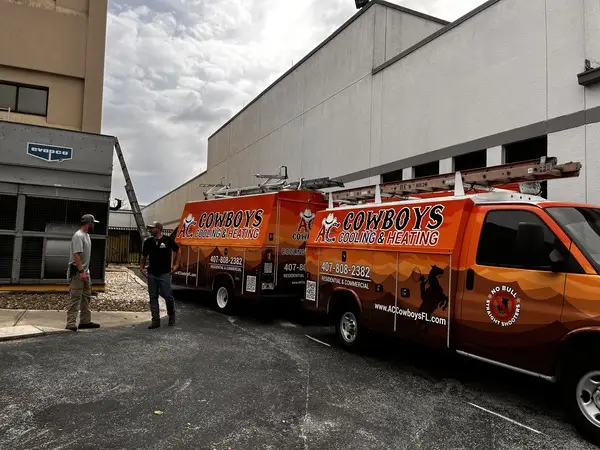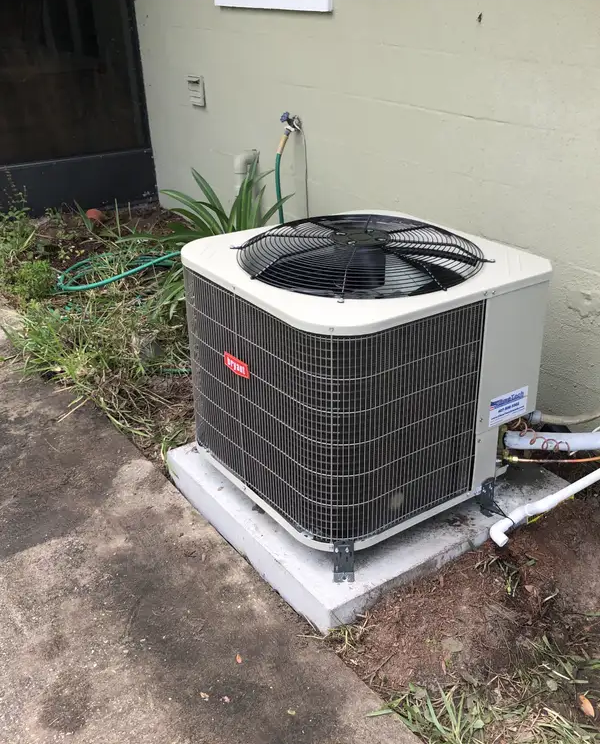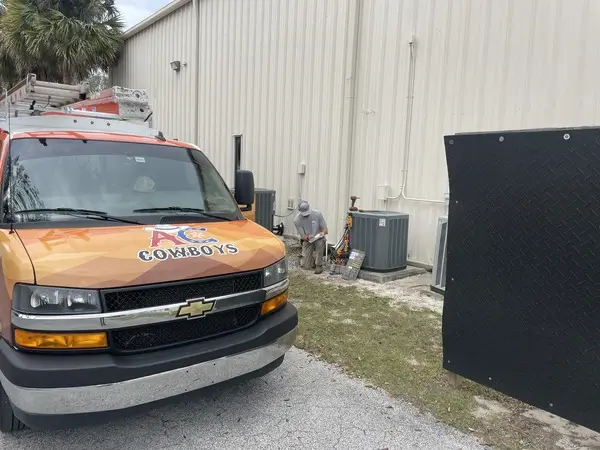AC Install Service Near Orlando, FL
Free Proposal
Air Conditioning Install Free Proposal

104 Trusted Reviews


AC Cowboys Heating & Cooling Provides AC Install Services Near Orlando, FL
Discover the root cause of your cooling and heating concerns with our comprehensive HVAC services in central Florida. Our expert team will diagnose your system’s issues and deliver tailored solutions to optimize your indoor comfort. From swift fixes to complete system overhauls, remodels, or replacements, we’ve got you covered. Trust the AC Cowboys to keep your home cozy and efficient year-round.


No matter the situation, our Orlando, FL professional HVAC technicians will work to determine the best plan of action for installing a new air conditioning system in your home or business. From there, we will review the recommendations with you in detail, so you will know exactly what solution is best for your cooling needs before any work is done.
Need to Have a Central Air Conditioning Unit Installed?
Having a central air conditioning unit installed in your home can provide several benefits, making it a popular choice for many homeowners. Here are some reasons why you might consider installing a central air conditioning system:
Central air conditioning systems can cool your entire home, providing consistent comfort throughout all rooms. This is especially important in larger homes or homes with multiple levels.
Modern central air conditioning units are designed to be energy-efficient, which can help reduce your energy bills compared to using multiple window or wall units. They often have programmable thermostats and zoning options to optimize cooling efficiency.
Central AC systems typically include air filters that can help remove dust, pollen, and other airborne allergens from the indoor air. This can improve indoor air quality and provide a healthier living environment for those in your home.
Central AC systems offer precise temperature control through a thermostat, allowing you to set and maintain your desired temperature easily. Some systems also offer humidity control, which can improve comfort.
Central AC units are usually quieter than window or portable units. The noisy components, such as the compressor and condenser, are located outside, reducing indoor noise levels.
Central AC systems are discreet, with the main components hidden away from view. This can improve the aesthetics of your home compared to having multiple window units.
Installing central air conditioning can increase the resale value of your home. Many homebuyers consider central AC an attractive feature and even a deal breaker when purchasing a property.
Many central AC systems can also function as heat pumps, providing both cooling in the summer and heating in the winter. This dual functionality can save you money on heating costs.
Central AC systems provide consistent cooling throughout your home, eliminating hot spots or uneven cooling that can occur with window units.
Central AC systems are designed to last for many years, and they often come with manufacturer warranties that can provide peace of mind.
Contact our highly-trained and certified HVAC experts for your A/C installation needs
AC Cowboys Heating & Cooling offers a full line of installation, maintenance, and repair that your cooling system may require. You can count on our trusted professionals for exceptional service and quality craftsmanship. AC Cowboys Heating & Cooling is proudly and professionally serving the greater Orlando, FL area.

Reviews
 Geeya Sickler2024-04-02Great company knowledgeable, helpful, timely, great communicators and the list could go on 😊
Geeya Sickler2024-04-02Great company knowledgeable, helpful, timely, great communicators and the list could go on 😊 PAUL BREAULT2024-04-01Mike was very knowledgeable and did an excellent job sharing that knowledge with me. Great patience responding to my questions.
PAUL BREAULT2024-04-01Mike was very knowledgeable and did an excellent job sharing that knowledge with me. Great patience responding to my questions. Andrew Birkmire2024-03-29Riley M. is amazing. He fixed everything very quickly and was so kind. He was very helpful and explained everything!
Andrew Birkmire2024-03-29Riley M. is amazing. He fixed everything very quickly and was so kind. He was very helpful and explained everything! Carl Cline2024-03-28Sean and Riley were great!! Diagnosed the issue quickly made repairs and explained their work
Carl Cline2024-03-28Sean and Riley were great!! Diagnosed the issue quickly made repairs and explained their work Shelly Mccormick2024-03-26The technician arrived on time very professional and knowledgeable about my system.
Shelly Mccormick2024-03-26The technician arrived on time very professional and knowledgeable about my system. ACenteno Official2024-03-12I’m very pleased with the Company very professional and Mike Calenda was amazing and very professional technician. Thank you
ACenteno Official2024-03-12I’m very pleased with the Company very professional and Mike Calenda was amazing and very professional technician. Thank you Constance Tipton2024-03-11We have dealt with Climatech on several properties for years. They always show up on time and know exactly what to do. We would never call anyone else.
Constance Tipton2024-03-11We have dealt with Climatech on several properties for years. They always show up on time and know exactly what to do. We would never call anyone else. James Garibaldi2024-03-09Fast, friendly and professional. I will be using them for years to come.Google rating score: 4.9 of 5, based on 110 reviews
James Garibaldi2024-03-09Fast, friendly and professional. I will be using them for years to come.Google rating score: 4.9 of 5, based on 110 reviews
Frequently Asked Questions About AC Install
There are several common signs that indicate your centralized air conditioning (AC) system may require repair or replacement. Recognizing these signs early can help you address issues promptly, potentially avoiding costly breakdowns and improving the efficiency of your system. Here are some key indicators:
- Insufficient Cooling: If your AC system is no longer keeping your space as cool as it used to, it may indicate a problem with the compressor, refrigerant levels, or other components.
- Uneven Cooling: Inconsistent cooling throughout your home or building can be a sign of issues with ductwork, airflow, or a failing thermostat.
- Poor Airflow: Reduced airflow from the supply vents can result from clogged air filters, duct obstructions, or problems with the blower motor.
- Strange Noises: Unusual noises such as banging, grinding, hissing, or squealing may suggest mechanical issues, loose components, or a failing compressor.
- Foul Odors: Musty or foul odors when the AC is running can be caused by mold or mildew growth in the system or dirty evaporator coils.
- High Humidity Levels: If your AC is struggling to control indoor humidity, it may indicate a malfunctioning dehumidification system or incorrect system sizing.
- Increased Energy Bills: A sudden or gradual increase in your energy bills without a corresponding change in usage may signal reduced efficiency in your AC system.
- Refrigerant Leaks: A decline in cooling efficiency and ice buildup on the evaporator coil can be signs of refrigerant leaks, which should be addressed promptly by a professional.
- Constant Cycling: If your AC system cycles on and off frequently (short cycling), it may be due to issues with the thermostat, compressor, or other components.
- Age of the System: Centralized AC systems have a limited lifespan. If your system is approaching or exceeding its expected lifespan (typically 10-15 years), it may be more cost-effective to replace it rather than repair it repeatedly.
- Inconsistent Thermostat Readings: If the thermostat displays inaccurate temperatures or fails to respond to temperature adjustments, it may need recalibration or replacement.
- Excessive Dust or Debris: A buildup of dust and debris on the evaporator and condenser coils can reduce system efficiency and cooling capacity.
- Water Leaks: Water leaks or moisture around the AC unit may indicate a clogged condensate drain line or a refrigerant leak.
- Frequent Repairs: If you find yourself repeatedly calling for AC repairs, it may be a sign that your system is nearing the end of its useful life, and replacement could be more cost-effective in the long run.
When you notice any of these signs, it’s essential to contact a licensed HVAC professional for a thorough inspection and diagnosis. They can determine the root cause of the issue and recommend the appropriate repairs or replacement if necessary. Regular maintenance can also help prevent many of these problems and extend the lifespan of your centralized A/C system.
A centralized air conditioning system, also known as a central air conditioner or HVAC (Heating, Ventilation, and Air Conditioning) system, is a cooling system that provides consistent and uniform cooling to an entire building or living space from a central location. This type of system is commonly used in residential homes, commercial buildings, and industrial facilities.
Installing a centralized air conditioning system offers several benefits, making it a popular choice for cooling residential homes, commercial buildings, and various other types of spaces. Here are some of the key advantages:
- Consistent Cooling
- Energy Efficiency
- Improved Indoor Air Quality
- Convenience
- Quiet Operation
- Enhanced Property Value
- Precise Temperature Control
- Less Obtrusive
- Space Savings
- Longevity
- Reduced Environmental Impact
It’s important to note that the specific benefits can vary depending on the type of centralized A/C system (e.g., split system, packaged system, ductless mini-split) and the quality of the installation. To maximize the advantages of a centralized air conditioning system, it’s essential to choose the right system for your needs, have it professionally installed, and maintain it regularly.
A centralized air conditioning (AC) system works by cooling and distributing conditioned air throughout a building or living space from a central location. The process involves several key components and a series of steps:
- Thermostat Control: The operation of the centralized AC system is controlled by a thermostat, which is typically installed in a central location within the building. Users can set the desired temperature on the thermostat to maintain a comfortable indoor climate.
- Central Unit: The heart of the system is the central unit, often located outside the building. This unit contains essential components, including:
- Compressor: The compressor pressurizes and circulates refrigerant throughout the system.
- Condenser Coil: The refrigerant, in a high-pressure, high-temperature state, is passed through the condenser coil to release heat and become a high-pressure liquid.
- Evaporator Coil: Located inside the building, the evaporator coil is responsible for absorbing heat from the indoor air.
- Refrigerant Lines: Copper or aluminum refrigerant lines connect the indoor and outdoor units, allowing the flow of refrigerant between them.
- Air Handling Unit: Inside the building, the air handling unit (AHU) is connected to the central unit through the refrigerant lines and contains the evaporator coil. The AHU circulates air from the building over the evaporator coil, where heat is absorbed, causing the air to cool down.
- Air Distribution: A network of ducts and vents is used to distribute the cooled air throughout the building. The cooled air is blown into various rooms or areas through supply vents or registers. Meanwhile, warm air is drawn back into the system through return vents.
- Filtration: Many centralized AC systems incorporate air filters to remove dust, allergens, and other particles from the incoming air, improving indoor air quality.
The basic operational cycle of a centralized AC system is as follows:
- The thermostat senses the indoor temperature and compares it to the set temperature.
- If the indoor temperature exceeds the set point, the thermostat signals the central unit to start cooling.
- The compressor in the central unit begins to circulate refrigerant. It takes heat from inside the building or home and releases it outside.
- As the indoor air passes over the evaporator coil, it loses heat, becoming cooler and more comfortable.
- The cooled air is distributed through the ductwork and supply vents, lowering the indoor temperature.
- The process continues until the indoor temperature matches the desired set point on the thermostat.
- The system cycles on and off to maintain the set temperature.
It’s important to note that centralized A/C systems can vary in complexity and features, and some systems offer additional capabilities such as zoning, humidity control, and advanced thermostat options. Additionally, regular maintenance is crucial to ensure the system operates efficiently and effectively.
without proper knowledge can lead to safety hazards and further damage.
Centralized air conditioning systems come in several types, each designed to suit specific needs and installation scenarios. Some of the most common types of centralized A/C systems include:
- Split System Central Air Conditioners:
- This is the most common type of residential centralized A/C system.
- It consists of two main components: an indoor unit (evaporator coil and air handler) and an outdoor unit (compressor and condenser coil).
- Split systems use a network of ducts to distribute cooled air throughout the building.
- They are suitable for homes and smaller commercial spaces.
- Packaged Central Air Conditioners:
- Packaged systems combine all the components (compressor, condenser, evaporator, and air handler) into a single outdoor unit.
- They are typically used in commercial buildings and homes with limited indoor space.
- Packaged units are available in different configurations, including rooftop units and ground-mounted units.
- Ductless Mini-Split Systems:
- Ductless mini-split systems are highly versatile and suitable for both residential and commercial applications.
- They consist of an outdoor condenser unit connected to one or more indoor air-handling units via refrigerant lines.
- Unlike traditional systems, they don’t require ductwork, making them ideal for retrofits and room-specific cooling.
- Ductless mini-splits can provide zoned cooling, allowing for individual temperature control in different rooms or zones.
The choice of centralized A/C system type depends on factors such as the size of the space to be cooled, existing infrastructure (e.g., ductwork), energy efficiency goals, and budget considerations. Consulting with an HVAC professional is essential to determine the most suitable system for a specific application and ensure proper installation and performance.
Professional installation is highly recommended, and in many cases, necessary for centralized air conditioning systems. Here are several reasons why professional installation is essential:
- Complexity: Centralized A/C systems are complex and require a deep understanding of HVAC principles, electrical work, refrigeration, and ductwork. Installing such a system without the necessary expertise can lead to errors, poor performance, and safety hazards.
- Sizing and Load Calculation: Determining the correct size of the A/C system for your space is crucial. An HVAC professional will perform a load calculation to assess factors like square footage, insulation, and climate to select the appropriate system size. An improperly sized system can result in inefficiency and discomfort.
- Ductwork: If your system relies on ducts for air distribution, they must be designed and installed correctly to ensure proper airflow and cooling. Leaky or poorly designed ductwork can lead to energy waste and inefficient cooling.
- Refrigerant Handling: Handling refrigerant requires specialized knowledge and certification due to environmental regulations. HVAC professionals are trained to handle refrigerants safely and prevent leaks, which can harm the environment and pose health risks.
- Electrical Work: Centralized A/C systems involve electrical connections, including high-voltage wiring. Incorrect electrical work can lead to safety hazards, including electrical fires or shock hazards.
- Manufacturer Warranty: Many manufacturers require professional installation to maintain the warranty on the A/C equipment. DIY installation may void the warranty, leaving you responsible for repair or replacement costs.
- Performance and Efficiency: Professional installation ensures that your A/C system operates efficiently and delivers the expected cooling capacity. Improper installation can lead to energy inefficiency, higher utility bills, and a shorter system lifespan.
- Safety: HVAC professionals are trained to identify and address safety issues, such as ventilation requirements, gas connections, and potential carbon monoxide risks in certain heating and cooling systems.
- Permits and Codes: HVAC professionals are familiar with local building codes and permitting requirements. They will obtain the necessary permits and ensure that the installation complies with all relevant regulations.
In summary, professional installation is essential for centralized cooling systems to ensure safety, efficiency, compliance with regulations, and the longevity of the equipment. It is a wise investment that can save you money and trouble in the long run.
Schedule a service
We can fix, maintain or replace anything from small residential systems to large complex commercial systems.
